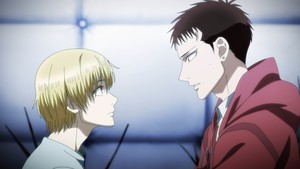The Night Beyond the Tricornered Window
Episode 12
by Rebecca Silverman,
How would you rate episode 12 of
The Night Beyond the Tricornered Window ?
Community score: 4.5

Sometimes it turns out that it was never about destroying a curse, but instead about just letting it go. There's a comfort in holding on to things that have been with you for a long time – a bad habit, a garment that's more hole than shirt, a favorite childhood snack that doesn't even taste good anymore. A piece of us may realize that those things need to go, but the reality is that keeping them close is the way it's always been, and that feels safer than the alternative. Essentially that's what the final episode of The Night Beyond the Tricornered Window reminds us: Hiyakawa and Sensei had been holding onto their curses and hatred and fear for so long that they forgot that those things weren't a part of them in the first place, and the only way to actually solve their problems wasn't to hurt or destroy their sources, but to simply let them go.
Of course, that's not easy. It's in some ways the equivalent of telling an anxious person that their anxiety is all in their head – of course it is, and that's the problem. That's what makes me really appreciate the way that the series chose to resolve its characters' issues: no one says to Hiyakawa that he just needs to get over his awful past and stop collecting bad things; they actively work to help him get through it. Both Mikado and Mukae seem to realize at the end that when Hiyakawa called Mikado his destiny, it wasn't so much a statement of fact as it was of hope – he wanted Mikado to be his destined person, because that meant that he wouldn't be alone anymore and that there was someone designated by fate to help him. This final episode doesn't spit on that idea, but rather shows that even with a concept like “fate” or “destiny” (or perhaps even “true love”) you have to work at it. Hiyakawa couldn't just make blanket statements and expect the world to go along with them; Mikado had to see him as a person worth helping in order for their purported destiny to be fulfilled. And even more than that, Hiyakawa had to see himself as someone who could be happy, because as we saw with Sensei's parallel course, if you don't help yourself, no one else can help you either – because Mikado's mom really did try.
Sensei's storyline is perhaps the least fulfilling piece of this episode. We leave him lying on the floor of his safe, overwhelmed by the realization of who he had become. That doesn't mean that he'll never be redeemed – his erstwhile wife's words to their son seem to imply that she's regained memories of him, and that may mean something – but the more important part of his role in the story is that he took a different path than Hiyakawa. Hiyakawa wasn't always a good person and he certainly didn't respect Mikado's will or bodily autonomy in the beginning, but he was also trying to get help. Sensei simply gave up the moment he decided that it came down to “me or him” with his son. Neither man gets a pass for their actions, but, the story implies, Hiyakawa was at least able to learn and willing to try to change. That's something that we're left thinking Sensei never got, making him the broken mirror of who Hiyakawa could have been under other circumstances. Sensei never had a Hanzawa or an Erika…but then again, he also never believed that he could, whereas some piece of Hiyakawa never forgot that he once had a mother who he believed loved him.
Mukae mentions at one point that the way to break curses is with love. That does seem to go back to the idea raised before that Hiyakawa saw himself as the prince who never gets rescued and the refutation of the notion that only damsels get saved. It's less about what you are and more about who, although it also returns to the idea that you really can't save everyone. If we look at the people rescued over the course of the series, it was those who worked with others, even if sometimes at cross purposes, who were redeemed: Erika, Hiyakawa, and in a more literal life-and-death sense, Sakaki. The rescuers – Hanzawa, Mukae, and Mikado (and, again in a more literal sense, Sakaki) – all felt that they were worth trying to save, even if at times they seemed to be fighting against their own redemption. Sensei never believed that he was worth saving, and that belief stymied any efforts that someone may have made on his behalf.
The Night Beyond the Tricornered Window certainly isn't a perfect adaptation of its source material. It also won't soothe every BL fan's genre craving, ending as it does without even a kiss. (Although I believe that's a direct refutation of how Hiyakawa didn't respect Mikado's boundaries in the beginning; Mikado shows that he's willing to move at a pace comfortable for them both.) But it is a story that carefully works through its themes and, if not overtly romantic, that does its best for its characters and their relationships. There's nothing final about its ending, and I'd count that a good thing, because everyone still has a lot to work through. At the end of the day, it reminds us, we may not be able to save everyone. But it's worth trying, because sometimes it's just about letting someone know that they're worth it.
Rating:
The Night Beyond the Tricornered Window is currently streaming on Crunchyroll.
discuss this in the forum (37 posts) |
back to The Night Beyond the Tricornered Window
Episode Review homepage / archives